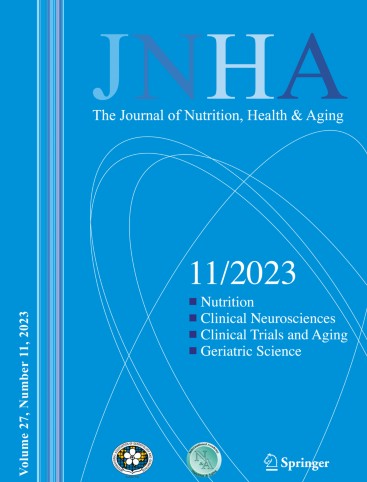在英国生物银行队列中,地中海、高质量和抗炎饮食与痴呆的关系
IF 4
3区 医学
Q1 GERIATRICS & GERONTOLOGY
引用次数: 0
摘要
本研究在英国的一个大型人群队列中研究了坚持地中海饮食、MIND饮食、推荐食物评分(RFS)、替代健康饮食指数(AHEI)和能量调整饮食炎症指数(EDII)与痴呆风险之间的关系。方法:我们分析了来自英国生物银行131209名参与者的数据,这些参与者年龄在40-69岁之间,基线时没有痴呆的诊断。使用经过验证的Oxford WebQ工具评估饮食摄入量,并计算每种饮食模式的依从性。使用基于ICD代码的算法定义的结果来确定痴呆发病率。应用经社会人口统计学、遗传和生活方式因素调整的细灰色亚分布风险模型来检验饮食指标与痴呆风险之间的关系。根据年龄、性别、肥胖状况和ApoEε4状态进行亚组分析。结果在中位13.5年的随访中,发现了1453例痴呆病例。较高的MEDAS、MIND饮食、RFS和AHEI依从性与痴呆风险降低显著相关(hr分别为0.79、0.73、0.72和0.77)。相反,较高的EDII分数表明促炎饮食与痴呆风险增加有关(HR: 1.3)。这些关联在老年人(≥60岁)、女性、非肥胖者和ApoEε4非携带者中更为明显。亚组分析揭示了基于人口统计学和健康相关因素的饮食模式的不同影响。结论:坚持地中海饮食、MIND饮食和高质量饮食可以降低患痴呆症的风险,而促炎饮食则会增加患痴呆症的风险。高质量的抗炎饮食在降低痴呆风险方面发挥着重要作用,在特定的亚组中观察到更强的效果。本文章由计算机程序翻译,如有差异,请以英文原文为准。
Association of Mediterranean, high-quality, and anti-inflammatory diet with dementia in UK Biobank cohort
Background
This study examined the relationship between adherence to the Mediterranean diet, MIND diet, Recommended Food Score (RFS), Alternative Healthy Eating Index (AHEI), and Energy-adjusted Dietary Inflammatory Index (EDII) and dementia risk in a large UK population cohort.
Methods
We analyzed data from 131,209 participants in the UK Biobank, aged 40–69 years, with no prior diagnosis of dementia at baseline. Dietary intake was assessed using the validated Oxford WebQ tool, and adherence to each dietary pattern was calculated. Dementia incidence was identified using algorithmically defined outcomes based on ICD codes. Fine–Gray subdistribution hazard models adjusted for sociodemographic, genetic, and lifestyle factors were applied to examine the association between dietary indices and dementia risk. Subgroup analyses were conducted based on age, sex, obesity status, and ApoEε4 status.
Results
Over a median follow-up of 13.5 years, 1453 dementia cases were identified. Higher adherence to the MEDAS, MIND diet, RFS, and AHEI was significantly associated with reduced dementia risk (HRs: 0.79, 0.73, 0.72, and 0.77, respectively). Conversely, higher EDII scores, indicating pro-inflammatory diets, were linked to an increased dementia risk (HR: 1.3). These associations were more pronounced in older adults (≥60 years), women, non-obese individuals, and ApoEε4 non-carriers. Subgroup analyses revealed differential impacts of dietary patterns based on demographic and health-related factors.
Conclusion
Greater adherence to Mediterranean, MIND, and high-quality diets is associated with a lower risk of dementia, while pro-inflammatory diets increase the risk. High-quality anti-inflammatory diets play a significant role in reducing the risk of dementia, with stronger effects observed in specific subgroups.
求助全文
通过发布文献求助,成功后即可免费获取论文全文。
去求助
来源期刊
CiteScore
7.80
自引率
3.40%
发文量
136
审稿时长
4-8 weeks
期刊介绍:
There is increasing scientific and clinical interest in the interactions of nutrition and health as part of the aging process. This interest is due to the important role that nutrition plays throughout the life span. This role affects the growth and development of the body during childhood, affects the risk of acute and chronic diseases, the maintenance of physiological processes and the biological process of aging. A major aim of "The Journal of Nutrition, Health & Aging" is to contribute to the improvement of knowledge regarding the relationships between nutrition and the aging process from birth to old age.

 求助内容:
求助内容: 应助结果提醒方式:
应助结果提醒方式:


